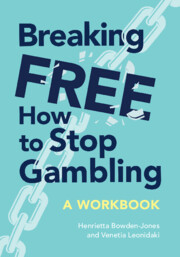Book contents
- Breaking Free
- Breaking Free How To Stop Gambling
- Copyright page
- Contents
- Acknowledgements
- Contributors
- 1 Introduction
- 2 How Do I Know if I Have a Gambling Disorder?
- 3 ‘I Should Quit but I Don’t Want To’: Increasing Motivation
- 4 ‘Buying Time’: Limiting Access to Money and Gambling
- 5 How Gambling Hijacks Your Brain
- 6 Retraining the Brain: Rewarding Yourself
- 7 Coping with Cravings and Urges
- 8 ‘Catching’ and Limiting Triggers Early
- 9 Things to Do When You Don’t Gamble
- 10 The Thinking Traps Driving Gambling
- 11 Challenging Gambling Thinking and Beliefs
- 12 How to Get Back on Track after a Slip
- 13 Don’t ‘Switch On’ the Auto-pilot: Future Planning
- 14 How Important Others Can Help
- 15 Final Remarks
- Appendix When to Consider Medication for a Gambling Disorder
- References
- Index
5 - How Gambling Hijacks Your Brain
Published online by Cambridge University Press: 16 June 2022
- Breaking Free
- Breaking Free How To Stop Gambling
- Copyright page
- Contents
- Acknowledgements
- Contributors
- 1 Introduction
- 2 How Do I Know if I Have a Gambling Disorder?
- 3 ‘I Should Quit but I Don’t Want To’: Increasing Motivation
- 4 ‘Buying Time’: Limiting Access to Money and Gambling
- 5 How Gambling Hijacks Your Brain
- 6 Retraining the Brain: Rewarding Yourself
- 7 Coping with Cravings and Urges
- 8 ‘Catching’ and Limiting Triggers Early
- 9 Things to Do When You Don’t Gamble
- 10 The Thinking Traps Driving Gambling
- 11 Challenging Gambling Thinking and Beliefs
- 12 How to Get Back on Track after a Slip
- 13 Don’t ‘Switch On’ the Auto-pilot: Future Planning
- 14 How Important Others Can Help
- 15 Final Remarks
- Appendix When to Consider Medication for a Gambling Disorder
- References
- Index
Summary
This chapter is about what happens to the brain when someone becomes addicted to gambling. It aims to help you understand better what you are up against when you try to break free from gambling. Because we are reviewing relevant research and theories, this book reads more technically than other chapters in the book. We are hoping that reading it will help you appreciate that you are up against a tricky brain. The skills covered in the rest of the chapters of this book are meant to help you re-train your brain. Applying the stimulus control, mentioned in the previous chapter, will help you ‘buy’ the time you need to re-train a tricky brain, taken over by gambling.
- Type
- Chapter
- Information
- Breaking FreeHow To Stop Gambling, pp. 40 - 47Publisher: Cambridge University PressPrint publication year: 2022

